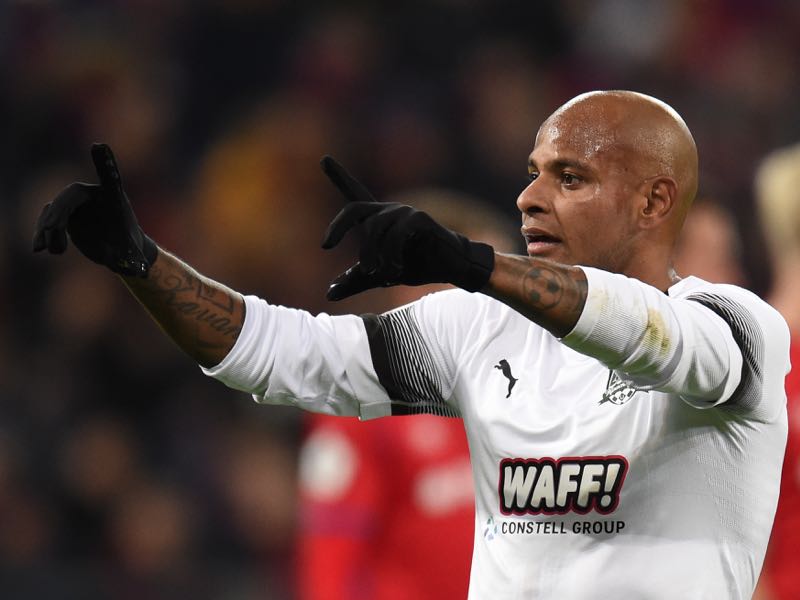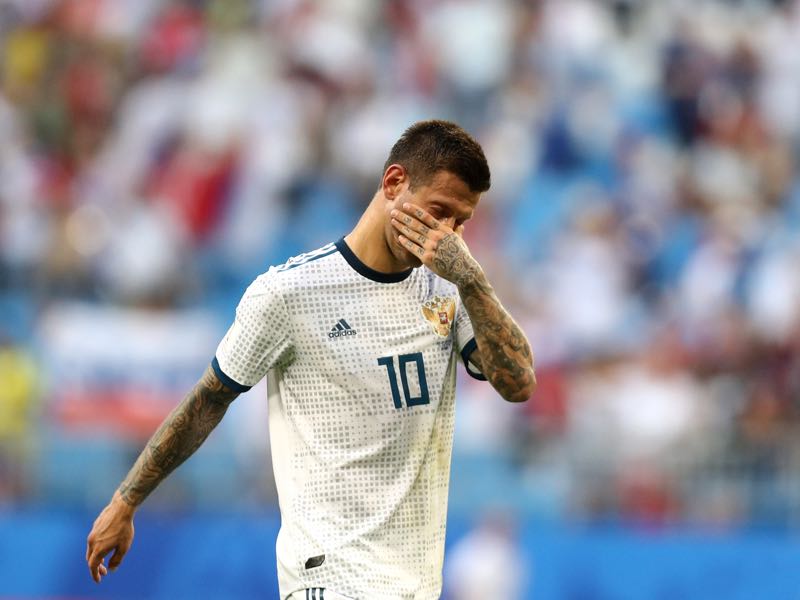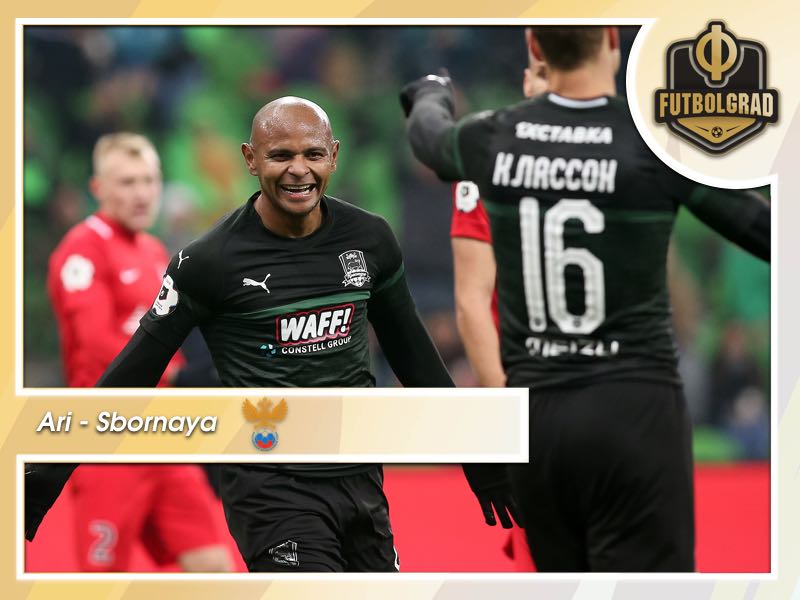Manuel Veth –
Nominated to replace the rested Artem Dzyuba the Brazilian born Ari could play his first game for his adopted homeland against Germany on Thursday.
It would complete a long path to naturalisation for the Fortaleza born striker. Ari started the naturalisation process all the way back in 2015 after marrying his Russian partner Natalia Gryzlova in December 2014. Having previously played for Brazil’s U20 side meant, however, that his naturalisation process, even with a Russian passport would not be easy – a player usually has to reside for five years in the country he wants to play for before making the switch.
The Futbolgrad Network’s Saul Pope first reported on Ari potentially playing for Russia all the way back in October 2015.
At the time former Russia manager Capello, when he was still in the job, said Ari was good enough to play for the Sbornaya and when the announcement about Ari’s citizenship application came, plenty of fans seemed to agree. Sample comments from the championat.com website included:
Our wooden stars need more competition and more pressure.
He’s a good passer: could organise our attacking game, dribbles well and has a good shot.
I think he’d be good for the national side. I don’t understand all this hurrah patriotism about only ethnic Russians being in the team.

Krasnodar’s Ari could finally make his Russia debut. (Photo by Epsilon/Getty Images)
It was, however, a bit of a different time. Russia had just come off a terrible World Cup in Brazil and with three years to go until the country would host the world’s biggest sporting event things looked dire for the Sbornaya.
Not that things would get much better for Russia. Leonid Slutsky would eventually guide Russia to the European Championships in France. But the tournament was marred with fan incidents off the pitch and catastrophic performances on the pitch. Russia would bow out at the group stage and with two years to go the World Cup the Sbornaya’s prospects of any success at the 2018 FIFA World Cup were slim at best.
Ari and a bumpy path to success
Not that things went much better for Ari either. The Brazilian striker scored just five goals in 21 games for Krasnodar during the 2015/16 season. The following year he scored just four goals in 11 games as he increasingly played second fiddle to Krasnodar’s biggest star Fedor Smolov.
As a result, Ari asked for a loan move and was granted such a deal by Krasnodar management in January 0f 2017. Sent on loan for one and a half seasons to Lokomotiv Moscow Ari started well for his new club scoring six goals in nine Russian Premier Liga games from March to the end of the season.
Furthermore, Ari would also win the Russian Cup in 2017 despite being sent off in the final minutes of the final against Ural. The Brazilian had been part of an on-field altercation following the match – not that it mattered much Ari seemed to be right at home at Lokomotiv and with the prospect of European football on track of playing for Russia after all.
Unfortunately, for him, however, there were to major obstacles to his call-up. One was the fact that Ari had played for Brazil’s U20 side, and although that would not stop him from playing for Russia, FIFA rules still mandate players switching nationalities to have played in their adopted nation for five years.
A technicality that was quickly overshadowed by personal tragedy when Ari ripped his ACL on matchday following matchday 2 of the 2017/18 RPL season. The Brazilian would subsequently miss 20 RPL games but would play a significant role during the final stretch of the season helping Lokomotiv to win their first title in 14 years.
What can Ari add to the Sbornaya?
Nonetheless, Ari ended up being sent back to Krasnodar at the end of the season as the Railwaymen opted to purchase Krasnodar’s star striker Fedor Smolov instead. In retrospect, Lokomotiv may think twice about the decision to go for Smolov rather than Ari.
Smolov had come off a difficult World Cup campaign after Artem Dzyuba had taken his spot as Russia’s go to striker. After the tournament, the 28-year-old striker has struggled with fitness concerns and scored just three goals in nine Russian Premier Liga games this season and after a shoulder injury and playing just 59 minutes against Rubin Kazan on the weekend was left out of Russia’s national team squad.

The World Cup was a tough lesson for Fedor Smolov and could ultimately benefit Ari (Photo by Maddie Meyer/Getty Images)
Ari, in the meantime, has played an excellent season. The native of Fortaleza has scored six goals and three assists in eight RPL games this year. Scoring a goal every 103 minutes the 32-year-old is second in the goalscoring chart together with his Krasnodar teammate Viktor Claesson and just behind his future Russia teammate Fedor Chalov (nine goals in 14 games).
Ari and Claesson, in fact, have contributed 48% of Krasnodar’s goals by mid-November and on top of his goalscoring rate is also sixth among RPL players when it comes to key passes played this season with 2.1 key passes per game. But most importantly for Sbornaya head coach Stanislav Cherchesov, Ari can play several attacking positions, which makes it easy to fit the 32-year-old into Russia’s system, which has become more adaptable since the World Cup.
Perhaps the only negative when it comes to Ari would be his age. At 32 Ari does not fit the evolution towards younger players that Russia has seen since the World Cup. But with two other native Brazilians regularly playing for Russia already, Mario Fernandes and Guilherme, it will be easy to integrate Ari, who in turn will bring plenty of experience to a team that despite recent successes is still somewhat in transition.
Manuel Veth is the owner and Editor in Chief of the Futbolgrad Network. He also works as a freelance journalist and among others works for the Bundesliga and Pro Soccer USA. He holds a Doctorate of Philosophy in History from King’s College London, and his thesis is titled: “Selling the People’s Game: Football’s transition from Communism to Capitalism in the Soviet Union and its Successor States,” which is available HERE. Originally from Munich, Manuel has lived in Amsterdam, Kyiv, Moscow, Tbilisi, London, and currently is located in Victoria BC, Canada. Follow Manuel on Twitter @ManuelVeth.





















COMMENTS